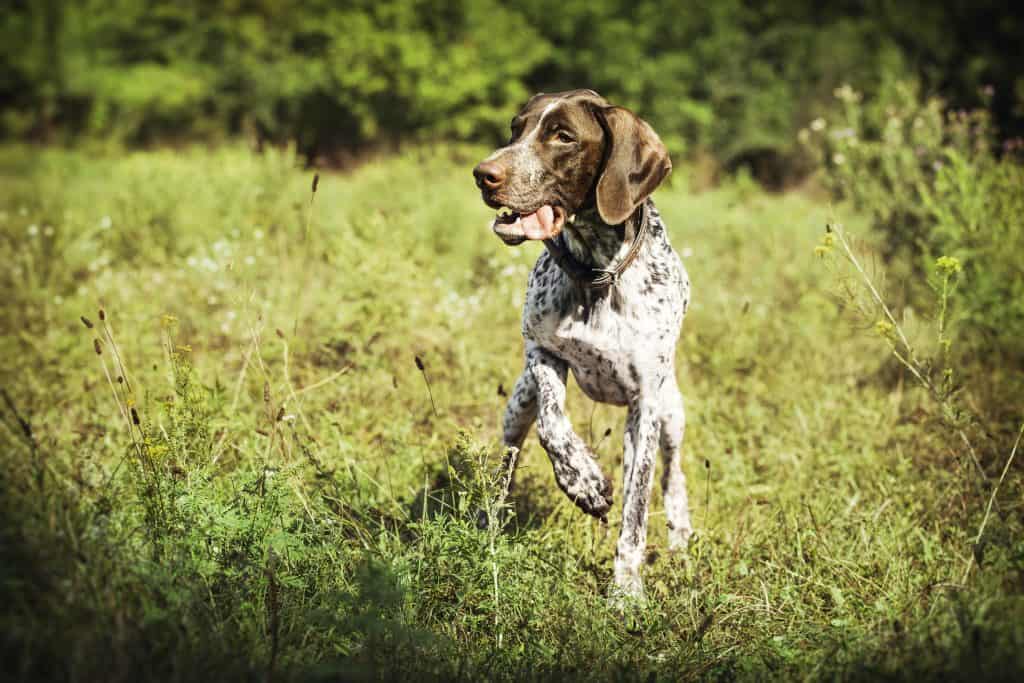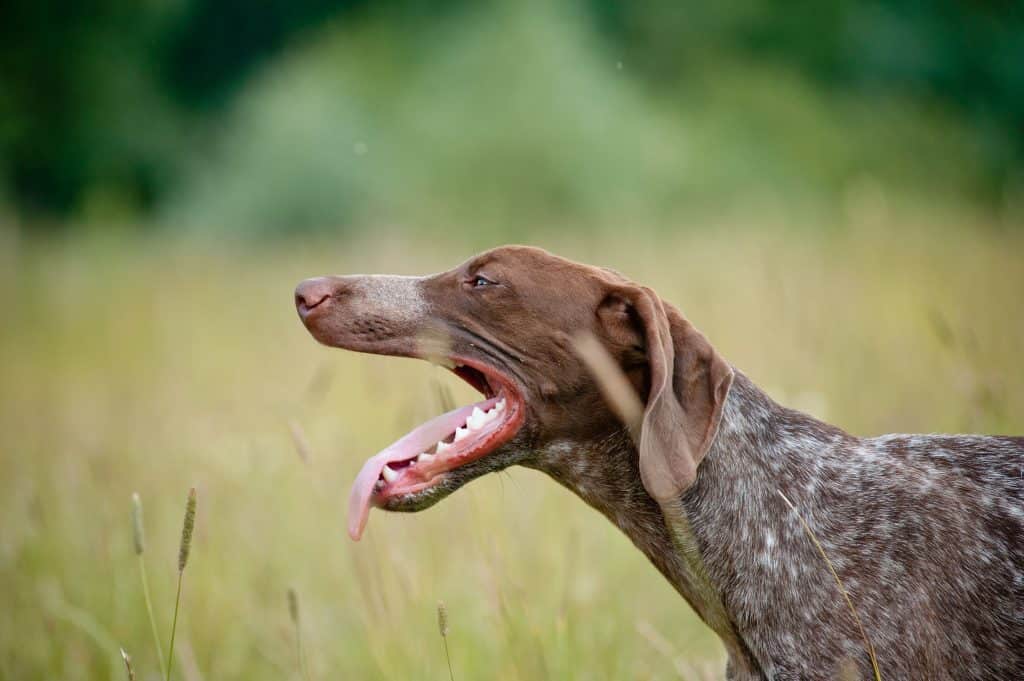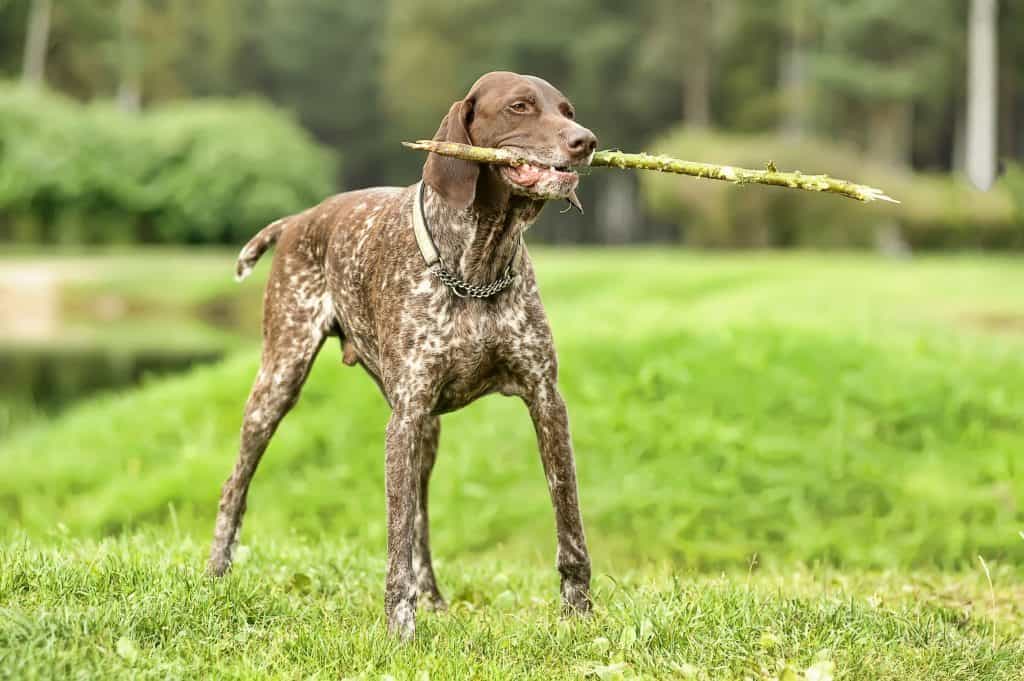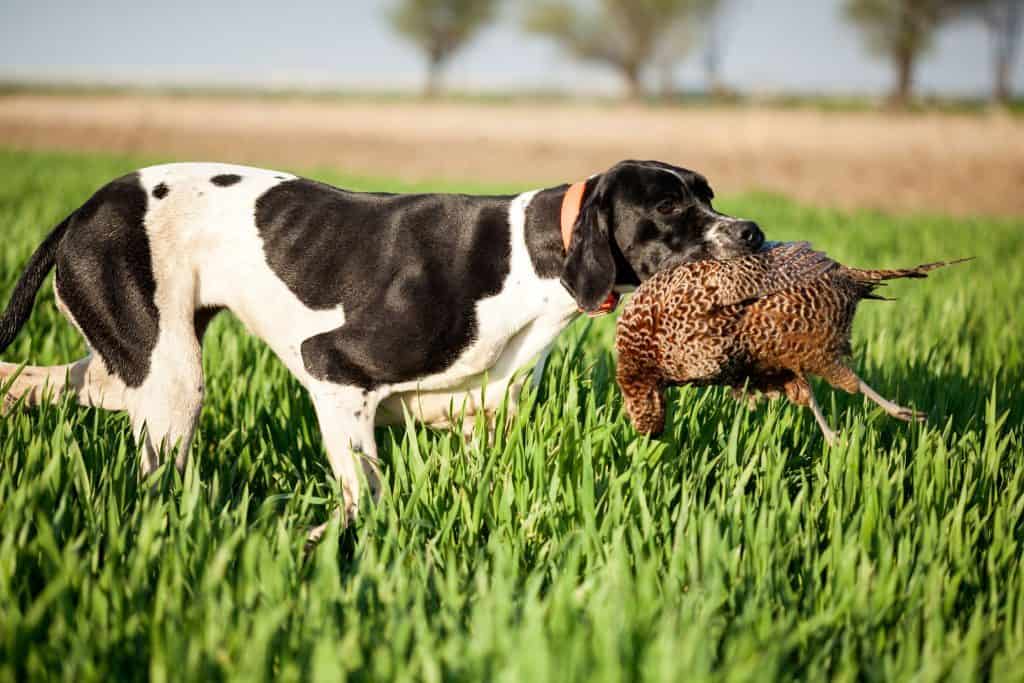Pointer Temperament: What’s it Like Owning One?
A pointer’s temperament is a staple of their personality and why people love them. It’s important to know if the temperament of your pointer fits in with the dynamic of your family.
What’s it Like Owning One?
Living with a pointer is fun and challenging. Pointers are strong-willed and independent. They love being with their families and having fun. It’s important to train them and let them exercise to get the most from their personalities.
These rather rambunctious and sweet animals are the best of both worlds. They can give you the excitement and thrill of an active lifestyle while also providing the comforts and calm of a day on the couch. Their temperament is not as cut and dry as it may seem, though, and knowing the origin and dynamic nature of this dog’s personality can go a long way to help an owner.
What It’s Like Owning a Pointer
Owning a pointer can be one of the greatest joys in a family and also one of the greatest frustrations. These creatures are extremely fun-loving and energetic. They absolutely love to be around their family and want to interact with you on a daily basis.
In a sense, they can be a bit “needy”. We all want to feel needed, and this dog definitely wants to spend time with you.
One of the absolute greatest things about dogs, in general, is that they are always happy to see you. Their pure joy at the sight of you can melt anyone’s heart and turn around a stressful day.
The pointer is no exception to this rule. They want to interact with you and absolutely love children. They are high energy and can play for hours. Their hyper and adventurous spirits require a lot of exercise each day.
When owning a pointer, it is very important that you are able to take them out for a few hours every day to burn off the high levels of energy that come hand in hand with their breed.
Perhaps Energizer batteries should have chosen a pointer as their mascot instead of the rabbit. The pointer was bred to sustain their energy for hours upon hours of hunting and running around.
Owning a pointer means you should expect to spend a few hours every day allowing them to exercise and let out some steam. They are perfect for families with an already active lifestyle. For others, it may become taxing to have to constantly take them out.
Perfect for families with an already active lifestyle.
If you are looking for an easy going dog and a relatively worry-free pet experience, the pointer’s constant need for attention is probably not for you.
A word that is very often used when describing a pointer’s personality is “congenial”. Pointers are just plain pleasant. They like to do what you like to do. They want to be outside, they want to play, and they want to sit on the couch and cuddle.
These are dogs that definitely want to be integrated into your life instead of just a side character in it that you feed twice a day, walk, and then ignore.
Something that is a huge plus to this even-tempered pooch is that they are not aggressive towards strangers or other dogs. They are certainly curious and may bark at other dogs, but they are rarely aggressive unless it’s a small animal that kickstarts their predator-prey instinct.
They are, however, initially a little reserved around new people or strange dogs, but they aren’t hostile. Cautiously optimistic is probably a good descriptive phrase.
It’s easy to ensure that your pointer has that bubbly social personality by socializing them during their puppy years. The more you handle them and bring them around different people and animals, the easier it will be for them to be around strangers without fear or aggression.

The overall temperament of pointers can be described by evaluating the sporting dog group as a whole. In 2006, the Matrix Canine Research Institute conducted a study that assessed dog temperament by separate groups.
They put a total of 25,726 dogs from different breed categories through several assessments not involving their owners. If one singular part of the assessment was failed through demonstrating aggression, panic, or “avoidance behavior” then the entire test was considered failed.
The sporting group had the highest passing rate with 85.48% of the dogs tested passing. This study goes to emphasize the good-natured temperament of the pointer.
| Breed Group | % Passing |
| Sporting | 85.48% |
| Pit Bull | 84.50% |
| Herding | 80.14% |
| Hound | 77.01% |
Source: http://www.fairdog.dk/elements/documents/research/canine-behavior.pdf
Temperament at Home
The pointer has two sides. At home, they can be the sweet-tempered household pet we love to cuddle with, and on the other hand, they can be a determined and ambitious hunter when out in the field.
This is something that makes the pointer such a great breed for active homes.
No matter how active the residents of a home are, there are always going to be times when nothing is going on and everyone is relaxing. The pointer can excel in this activity, too. It’s not just going to happen, though, and you’ll want to work every day to ensure peaceful downtime for you and your family.
To accomplish this, it is recommended that you go on long walks, runs, bike rides, hikes, or play in a big open area to expel that exuberance. Vigorous exercise is key to a happy home. This being said, pointers are better suited to active family homes.
They aren’t recommended for apartment or city living. That’s definitely something you want to know about owning a pointer.
The small enclosed space of an apartment can just amplify their need for freedom. Barking, whining, and chewing on anything in sight are all ways in which the pointer expresses its discomfort.
Their nonstop energy and restlessness are hurdles to happy indoor pet life. On the other hand, once they have exercised and mellowed out a little bit, the pointer is a great indoor dog.

They prefer to be indoors with their family. You shouldn’t be surprised when your pointer wants to snuggle up next to you on the couch vegging out.
They are very sweet and even-tempered when they’re not being cooped up for too long.
When a pointer is left alone for too long without exercise or attention, their boisterous spirits can turn from endearing to destructive. As was previously mentioned, all that pent up energy can manifest itself in the form of barking, chewing, and digging.
These behaviors are never something that we want from our pets, but it’s important to know that trade-offs come with any breed. You can combat a lot of these negative behaviors by establishing good habits and routines.
The pointer is a very gentle animal, but they can’t always control those impulses to keep their minds engaged.
These are the consequences of having a pointer who is bored, so it’s very important to know ways to combat that. Breeding a dog to have endurance in the hunting field and an instinct to play and locate prey means that they require other outlets to avoid those particular ruinous tendencies.
Having a calm and constantly good-natured pointer requires a little bit of work from its owners.
Creating a routine of daily exercise can help to make your dog happy, healthy, and relaxed for the entire family to enjoy.
Changing these behaviors for your dog can also help benefit your own health and happiness. So, all in all, it ends up being a win-win.
Temperament in the Hunting Field
Like I’ve previously mentioned, pointers have always been bred to be hunting dogs. The AKC (American Kennel Club) classifies them as “sporting dogs”, and the UKC (United Kennel Club) gives them a “gun dog” classification.
This is an entirely new side of their personality that isn’t taken into account if they’re living in a family with no intention to take them hunting. However, parts of their natural hunting abilities definitely show in their training ability, interaction with small animals, and boundless energy.
It’s important for any type of owner to learn about the pointer’s hunting ancestry to really understand their temperament, natural abilities, and personality.
Pointers were bred from many different hound, setter, spaniel, and terrier breeds. Their agreeable temperament is said to derive from the setting spaniel, and all other hunting instincts, strength, and abilities come from the hodgepodge of hunting dog breeds intermixed.
The following is a list of the pointer’s characteristics that have derived from its hunting background:
- energetic
- intelligent
- competitive
- determined
- ambitious
- loyal
- easily distracted
- dignified
- curious
- bold
Once trained properly, the pointer is a disciplined and intelligent hunting companion. Once he or she steps onto the hunting field, after a lot of training in this element, he or she automatically knows what to do.
Disciplined and intelligent hunting companions…
His (or her) job has always been to locate potential prey (mostly birds and hares) and “point” the hunter to them. These canines can also be trained to retrieve hunted prey, but this requires even more training.
The pointer will wander around sniffing and searching. Once he or she catches wind of the prey, the pup will stand perfectly still in a natural pointing position for as long as it takes for his or her owner to locate the prey.
Training your pointer will definitely require a lot of time and patience, but the challenge is well worth it in the end.
As you have seen from the list I mentioned earlier, the pointer’s temperament can be traced back to their hunting ancestry a lot of the time.
They are extremely energetic because of the endurance and stamina required from hunting. They are curious and can get easily distracted because of their instinct to listen for and sniff out prey. They are smart and adventurous due to their independent hunting style.
When trying to understand a pointer and its temperament, it’s important to know where it all comes from. Understanding your dog breed and its original purpose can help you decide which is right for you and how to interact with them in your daily life.
The great thing about the pointer’s background is that they are made to obey. They are stubborn and easily distracted which makes getting to an obedient point hard, but they are smart which allows them to learn quickly and loyal enough to want to try.
The temperament of your pointer comes a little bit from their individual personalities, but a lot can be done to create a more agreeable dog through training and love.

Temperament for Training
As mentioned in the previous section, pointers are dogs desperately in need of training. On the other hand, they are also dogs that are smart and determined enough to learn well.
An important thing to know about pointers is that they are lovers. They want your affection and they will most certainly give you theirs. This, however, also makes them very sensitive.
This sensitivity can be a great strength for this family loving dog, but it can also be a weakness when using certain training techniques. Pointers are loving but they are stubborn.
They will respond negatively to any attempts to yell or discipline bad behavior by force.
They will become difficult to work with and distrustful quickly. The best method for training a pointer is by positive reinforcement through treats, encouraging words, and petting.
They love to be loved, and their loyalty to and desire to please you will increase throughout the experience.
It’s important that your pointer knows that they’re not running this show. You take command of the situation and teach who is in charge by consistent and patient training. If your pointer can’t get away with certain behaviors in training, they won’t try them at home.
Another roadblock on the way to a fully trained pointer is their tendency to become distracted by smells, sounds, people, and animals. This distractibility, again, comes from their natural instincts to be hyper-attentive and find prey.
You’ll need to keep training interesting through treats and fun activities to really engage your pointer and retain its attention. In the next section, I’ll give some tips about the best training practices for a great pointer.
Training a Good-Natured Pointer
There are two schools of thought when it comes to training a “good-natured” pointer.
To some reading this, it may look like a calm and fun family dog who can play for hours with the kids and sit on the couch while you watch a movie. For others, it will look like an obedient, smart, and disciplined hunting companion that can double as a loving family dog.

Either way, the pointer needs to be trained no matter if they’re involved in your hobbies or not. Pointers are very intelligent and need to be active. This doesn’t just include their physical training and exercise, but you have to exercise their minds too.
Looking past simple puppy training, your pointer will need to be trained consistently for most of its life.
Playing fetch and other games with your pointer will go a long way to keeping its mind sharp and active along with its body. Sometimes running is not enough for this smart athlete.
This is not to say that training as a puppy is not as important because it is crucial to the life and happiness of you and your pointer. Here are some great ways to train your pointer no matter the situation.
Training Basics
There are some basic rules that you’ll want to follow no matter what you want from your pointer. You’ll want them to know basic commands like “sit”, “stay”, “down”, and “heel” just like any other good dog.
I can tell you from experience that having a dog that gives no response when you say “heel” is the most frustrating thing.
I constantly had to chase down or go to my dog to get them to obey. My very first dog had me better trained than I did him. If he didn’t come to me then I would certainly come to him.
That is not the relationship you want with your pointer.
One of the most important things for your pointer puppy to learn is that you are Alpha. You are the leader of this pack and he or she is not. This is something that is learned through consistency and patience.
Patience shows the dog that they can’t get out of something just because they fight or be difficult. The puppy won’t ever be rewarded for the behavior you don’t agree with, so they will slowly realize who’s boss.
You want to start training your pointer absolutely as soon as possible. The training will change and intensify as the dog grows older and more mature, but any bit of learning can be beneficial for a pointer.
Start training your pointer as soon as possible.
Usually, owners can take a puppy home when they reach at least 8 weeks old. This is not too young to start training. Many owners find that crate training is very helpful to house train your dog and keep them from tearing things up.
That is the first kind of teaching they will be exposed to.
As they age, you should be integrating commands into everyday life. Puppies are very impressionable and pointers are even more so. They are fast learners and can pick up bad habits just as easily as good ones.
There are many training games you can try but an effective and exciting one is the simple “fetch” game. The pointer will be excited to chase something and play tug of war.
Try many different things with your pointer to help them understand commands and stay excited about training.
Hunting-Specific Training
When purchasing a pointer to be used for hunting, you’ll also want to start them at a young age. They will require basic obedience training for a while before they can really be susceptible to hunting training.
Something great about pointers natural instincts is that they can sometimes show signs of pointing at as early as two months old. This really shows you how ingrained hunting is in their general makeup.
You’ll need to keep a structured environment for your pointer as you train them. Consistent exercises that teach the “woah” command (a command that tells your pointer to stop immediately) and other vital commands for general obedience outdoors will be required for positive results.
The “woah” command is usually interchangeable with the “stay” command, but “woah” is more universally known in the hunting community.
Slowly you’ll grow from teaching the “woah” command to tossing around a bird’s wing to try to get your pointer to stop and stalk it instead of pouncing on it. Having a bird wing at the end of a fishing pole line can help you wave it around and keep it out of your dogs reach.
The bird wing moves everytime the dog tries to approach it. If they stay back and point, then it stays put.
Exercises like these are great for pointer puppies because they are physically and mentally stimulating. It also doubles as a way to teach your pointer that you have to point to not scare away the prey.
There are plenty of hunting specific exercises you can work on with your pointer to create the temperament you’re looking for. You want an obedient, calm, and determined hunting partner.
You want them to understand and respond accordingly to each given command. This comes with working with them constantly and rewarding good behavior. In the end, you’ll have the obedient and happy pointer you wanted.
Here is a video from Standing Stone Kennels that shows a few things that you’ll want to do with your pointer puppy to encourage good behaviors. Simple things can go a long way to developing the best parts of your pointer’s agreeable temperament.
Your Life When Owning a Pointer
If I haven’t already, I’d like to paint you a picture of what life would be like with a pointer.
You can expect pointers to live to be around 12-15 years old. This is a long time to be with a pet, and they will easily become a very important part of your family.
They are very affectionate and will love your kids especially. You or your children will find a playful companion that is constantly excited to go on a walk or play fetch.
I don’t know about you, but I see a dog and my first reaction is to hug them. Good thing I’m an adult and know not to do that to strange dogs, but it’s still my first impulse because they are so naturally loving and joyful.
If you are like me and crave those puppy cuddles, pointers are great for that! They will be as quick to jump up on the couch to sit next to you as they are to chase a ball thrown at the park.
Their agreeable demeanor is what draws a lot of people to them. Some people find their exuberance a little off-putting when they just want to sit and relax. Pointers want to be near you, but they also want to be pet and paid attention to for a lot of the day.
People who have pointers usually don’t find it pleasant to have other small pets in the home. Pointers will always have a natural instinct to hunt prey especially since they were bred to find hare and bird.
You will almost never see a pet bird and a pet pointer coexisting safely under the same roof. Rabbits, rodents, and cats can also grab the pointers attention and excite that natural instinct to chase and catch.
Some do find that a pointer that is introduced to a cat or other pet very early to grow up alongside them will usually be okay.
Once the association is there and they’re used to having that small pet around you probably won’t have too much of a problem.
Many people with pointers also find it very beneficial to have a fenced in yard that the dog can roam around in. The pointer is very interested in rabbits and squirrels and can run off when they catch wind of one.
They’re curious and distractable, so you’ll want to keep them on a leash and fenced in to minimize the possibilities of them roaming too far and are unable to get back.
Again, you will also want to set aside at least one hour a day (two is recommended) to give your pointer vigorous exercise. This can come in many different forms depending on your personality, interests, and resources.
Owners who want to integrate their pointers into a hunting regime will consistently be taking their pointer out to a hunting field to familiarize them with the lay of the land while also getting that exercise in.
Wide open fields are an ideal setting for your pointer’s to run around, follow scents, and play no matter if you’re a hunter or not.
It can be said that a happy dog makes a happy owner which will, in turn, make a happy life! Taking these steps will go a long way to ensure an even-tempered pup that you love to be around.
Anyone can have the obedient, loving, and happy dog they have always wanted. This can quickly turn into a pipe dream if you’re not willing or ready to spend months training and working with your pointer to obtain those desired results.
Pointers are fantastic dogs with a great temperament if you take the time to work with the information about the breed that you’ve been given.
